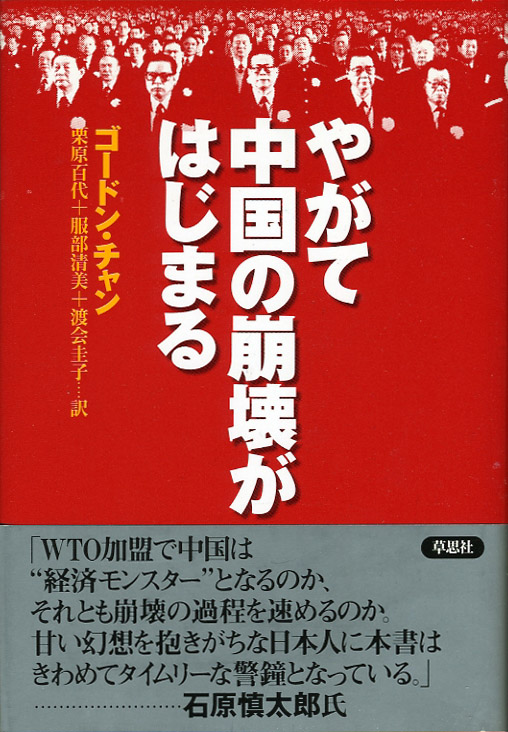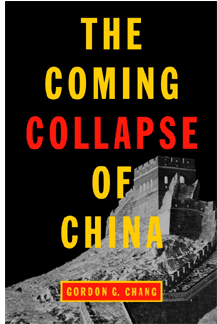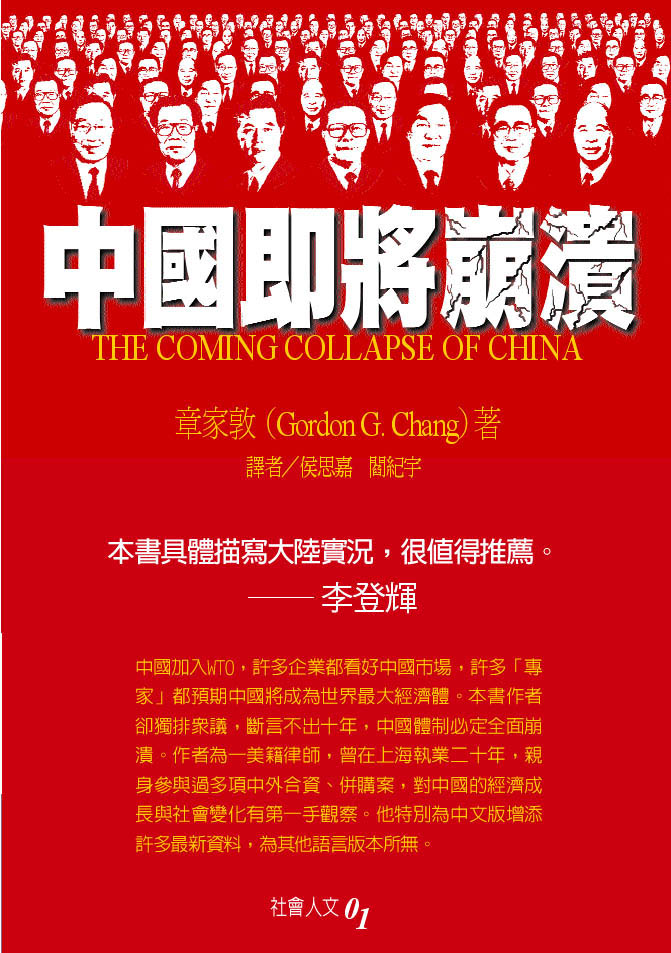THE BUSH ADMINISTRATION IS seeking an enemy abroad, and China has obliged. The bluff and bluster of Beijing during the recent spy plane flap gave American conservatives running room to advocate a return to Cold War-era policies. But no sooner had Donald Rumsfeld’s Pentagon announced that the United States was cutting off military ties with China than the Bush White House backed off the order and, in the meantime, continues to lobby Congress in support of increased trade with China. In the collision between commerce and confrontation, the businessman continues to win out in the GOP.
In The Coming Collapse of China, Gordon G. Chang says that both sides have it wrong. China, he declares, is headed for the scrapheap of history. It’s certainly a case worth considering. One empire after another collapsed in the past century. Why should China, an old-fashioned empire made up of hundreds of different ethnic groupings, be any different?
Chang, a lawyer who worked for two decades in China, has written an impassioned book that rests on penetrating diagnoses and old-fashioned gumshoe reporting, conducting interviews with everyone from the high-and-mighty to the common peasant. His aim is to present an unvarnished portrait of China, free of the romanticism of the business lobby and the alarmism of the new cold warriors.
Chang focuses on the Communist Party, arguing that its failure to adapt to new economic and political challenges has made it as vulnerable to upheaval as previous Chinese imperial dynasties. He ascribes much importance to the emergence of the Falun Gong and contrasts it with the moral emptiness of the Communists. The best that Fu Qing-yuan, director of the Research Institute of Marxism-Leninism, can tell him is that “Many people in China are facing a crisis of faith. But I still believe that the majority of the Chinese people believe in dialectical materialism”
Chang notes that China is a hotbed of religious growth. One sign of religious fervor has come in the mushrooming of so-called “house churches.” These Christian evangelical churches are independent of the government and meet secretly. They have been the target of much persecution. Then there is the well-known Falun Gong, which first rang alarm bells among the Communist leadership when it became clear that the movement had numerous adherents among party cadres. As Chang puts it, “Guess which religion is more popular: the one that promises a life after this one or the one that decrees that there is none?” Chang goes on to remark that while Falun Gong is just a large sect, “tomorrow anything can happen. The Falun Gong episode highlights yet again the weakening grip of the apparently mighty Communist Party.”
This is too vague. “Anything can happen” is a meaningless phrase. What’s more, the collapse of the party need not entail the disappearance of China. Chang believes that China will go the way of the Soviet Union, splitting into various states. Unfortunately, Chang does not provide particulars about how he envisions the breakup. Had he discussed the ethnic and geographic fault lines that he believes run through China, his argument would have been greatly strengthened.
He seems to believe that the difficulties that the regime faces–unemployment, religious tensions, loss of faith in communism–will inevitably lead to collapse. He points to Tibet as an example of a native population that has resisted Chinese rule, but does not go beyond what is commonly known about the dreadful Chinese occupation of that country. Nor is there much reason to believe that an uprising is imminent in Tibet. Chang also cites the Falun Gong as a harbinger of potential revolt. But he skips too easily from religious to ethnic tensions. After discussing the Falun Gong, he moves to Central Asia, where Uighurs are revolting against Chinese rule. But there is a fundamental difference between religious and ethnic tensions: Religious claims are transcendent ones, whereas ethnic tensions almost invariably rest on the claim of racial exclusivity.
Chang’s overriding belief, however, is that economic troubles are the main weakness of the party. He notes, for example, that Beijing’s insistence on incorporating minorities has led it to embark upon wasteful and destructive development projects, designed to employ large numbers of people in the fashion of 1960s World Bank projects. Again, however, Chang might have gone into greater detail about the projects that he considers to be squandering precious resources and funds. At most, he observes that “China cannot afford to waste its precious resources on conquering small minorities, especially when they are resistant.”
In his eagerness to highlight the debility of the regime, Chang singles out the parlous state of heavy industry and the rise in unemployment. Reform, the elixir that is supposed to save China and the party, has left tens of millions unemployed. According to Chang, “at any one time, somewhere between 70 to 130 million migrants are roaming China for work.” There is more: “While Beijing fusses over imagined enemies, labor protests occur across China as workers go for months without pay and as simple industrial disputes spiral out of control.”
Chang is surely right to warn of the discontent of workers. He might have noted that one of die reasons that the Chinese leadership cracked down so viciously on the Tiananmen protesters in 1989 is that they were drawing supporters from the peasantry and workers–the traditional power base of the party. In somewhat overheated prose, Chang goes so far as to declare that “China is a lake of gasoline,” and that an individual, “in some small town, or large city, will only have to throw a match.”
The problem with this scenario is that, as Adam Smith observed, there is a great deal of ruin in a country. Ironically, Chang himself is adopting a materialist interpretation of Chinas past and future. He sees the Soviet scenario replaying itself in China. But it is important to remember that economic troubles alone were not what brought down the Soviet Union, though they helped mightily. The real question is whether or not the Chinese Communist Party, like the Soviet one, will lose its nerve and self-confidence. So far, it has not. Indeed, it seeks to bolster its claim to rule by turning to nationalism. How much communism still has to do with the Communist Party is an open question. Given the nationalist sentiment that seems to be brewing in China, the regime is being pushed to take a more assertive course against Taiwan and the United States. It seems clear that the regime underestimated public outrage after the American bombing of the Chinese embassy in Belgrade and that, during the spy-plane crisis, it came close to doing so again.
No less than American businessmen, Chinese elites are torn between two desires: greed and the wish to stand up to the United States. It is also the case that the Communist Party has an object lesson in the perils of political reform in the collapse of the Soviet empire.
It is unfortunate that Chang does not speculate on how a transfer of power might take place. Does he really expect China to go up in flames? Or might a peaceful transition be in the offing? Chang understandably sees the disappearance of the Communist Party as an unalloyed good. Given what happened in Serbia and other nations run by so-called communists, however, it seems prudent to wonder what would follow the formal dissolution of the Communist Party. Perhaps an even more truculent China will emerge. Even a democratic China would have national interests that conflicted with American ones.
Whatever its shortcomings, though, Chang’s book will surely stir up controversy simply because too little attention has been focused on the prospect of the disappearance of the Chinese empire. Perhaps the reason that Chang’s argument hasn’t come to the fore yet is because more upheaval is the last thing world leaders want. The only thing that Chinas neighbors, and the United States, may fear more than a rising China is one that collapses.














































